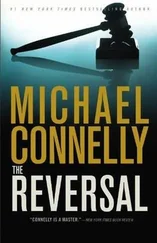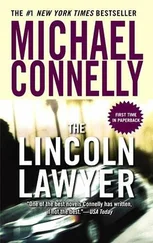Despite the drab circumstances and his hopes that his stay would be temporary, Bosch tried his best to transform the hotel room into a home. He hung some clothes in the closet, put his toothbrush and shaving kit in the bathroom and set the answering machine up on the phone, though nobody knew his number. He decided that in the morning he’d call the telephone company and have a forwarding tape put on his old line.
Next he set up the stereo on the bureau. For the time being he just placed the speakers on the floor on either side of the bureau. He then rummaged through his box of CDs and came across a Tom Waits recording called “Blue Valentine.” He hadn’t listened to it in years so he put it on.
He sat down on the bed near the phone and listened and thought for a few minutes about calling Jazz in Florida. But he wasn’t sure what he could say or ask. He decided it might be better to just let it go for now. He lit a cigarette and went to the window. There was nothing happening in the alley. Across the tops of the buildings he could see the ornate tower of the nearby Hollywood Athletic Club. It was a beautiful building. One of the last in Hollywood.
He closed the musty curtains, turned around and studied his new home. After a while he yanked the spread off the bed along with the other covers and then remade it with his own sheets and blanket. He knew it was a small gesture of continuity but it made him feel less lonely. It also made him feel a little bit as though he knew what he was doing with his life at that point and it made him forget for a few more moments about Harvey Pounds.
Bosch sat on the newly made bed and leaned back on the pillows propped against the headboard. He lit another cigarette. He studied the wounds on his two fingers and saw that the scabs had been replaced with hard pink skin. They were healing nicely. He hoped the rest of him would, too. But he doubted it. He knew he was responsible. And he knew he had to pay. Somehow.
He absentmindedly pulled the phone off the bed table and placed it on his chest. It was an old one with a rotary dial. Bosch lifted the receiver and looked at the dial. Who was he going to call? What was he going to say? He replaced the receiver and sat up. He decided he had to get out.
MONTE KIM LIVED on Willis Avenue in Sherman Oaks in the midst of a ghost town of apartment buildings red-tagged after the quake. Kim’s apartment building was a gray-and-white Cape Cod affair that sat between two empties. At least they were supposed to be empty. As Bosch pulled up he saw lights go out in one of the buildings. Squatters, he guessed. Like Bosch had been, always on alert for the building inspector.
Kim’s building looked as though it had been either completely spared by the quake or already completely repaired. Bosch doubted it was the latter. He believed the building was more a testament to the serendipitous violence of nature, and maybe a builder who didn’t cut corners. The Cape Cod had stood up while the buildings around it cracked and slid.
It was a common, rectangular building with apartment entrances running down each side of it. But to get to one of the doors, you had to be buzzed through a six-foot-tall electronic gate. The cops called them “feel good” gates because they made the dwellers inside feel safer, but they were worthless. All they did was put up a barrier for legitimate visitors to the building. Others could simply climb over, and they did, all over the city. Feel good gates were everywhere.
He said only that it was the police when Kim’s voice sounded on the intercom and he was buzzed in. He took the badge wallet out of his pocket as he walked down to apartment eight. When Kim opened up, Bosch shoved the open badge wallet through the door and about six inches from his face. He held it so his finger was across the badge and obscured the marking that said LIEUTENANT. He then pulled the wallet back quickly and put it away.
“I’m sorry, I didn’t catch the name on there,” Kim said, still blocking the way.
“Hieronymus Bosch. But people call me Harry.”
“You’re named for the painter.”
“Sometimes I feel old enough that I think he was named for me. Tonight’s one of those nights. Can I come in? This shouldn’t take long.”
Kim led him into the living room with a confused look on his face. It was a decent-sized and neat room with a couch and two chairs and a gas fireplace next to the TV. Kim took one of the chairs and Bosch sat on the end of the couch. He noticed a white poodle sleeping on the carpet next to Kim’s chair. Kim was an overweight man with a wide, florid face. He wore glasses that pinched his temples and what was left of his hair was dyed brown. He wore a red cardigan sweater over a white shirt and old khakis. Bosch guessed Kim wasn’t quite sixty. He had been expecting an older man.
“I guess this is where I ask, ‘What’s this all about?’ ”
“Yeah, and I guess this is where I tell you. Problem is I’m not sure how to begin. I’m investigating a couple of homicides. You can probably help. But I wonder if you’d indulge me and let me ask you some questions going a while back? Then, when we’re done, I’ll explain why.”
“Seems unusual but…”
Kim raised his hands and waved off any problems. He made a movement in his chair as if to get more comfortable. He checked the dog and then squinted his eyes as if that might better help him understand and answer the questions. Bosch could see a film of sweat developing in the defoliated landscape that had once been his scalp.
“You were a reporter for the Times. How long did that last?”
“Oh, boy, that was just a few years in the early sixties. How do you know that?”
“Mr. Kim, let me ask these questions first. What kind of reporting did you do?”
“Back then they called us cub reporters. I was on the crime beat.”
“What do you do now?”
“Currently, I work out of my home. I’m in public relations. I have an office upstairs in the second bedroom. I had an office in Reseda but the building was condemned. You could see daylight through the cracks.”
He was like most people in L.A. He didn’t have to preface his remarks by saying he was talking about earthquake damage. It was understood.
“I have several small accounts,” he continued. “I was a local spokesman for the GM plant in Van Nuys until they closed it down. Then I went out on my own.”
“What made you quit the Times back in the sixties?”
“I got-Am I a suspect in something?”
“Not at all, Mr. Kim. I’m just trying to get to know you. Indulge me. I’ll get to the point. You were saying why you quit the Times.”
“Yes, well, I got a better job. I was offered the position of press spokesman for the district attorney at the time, Arno Conklin. I took it. Better pay, more interesting than the cop beat and a brighter future.”
“What do you mean, brighter future?”
“Well, actually I was wrong about that. When I took the job I thought the sky would be the limit with Arno. He was a good man. I figured I’d eventually-you know, if I stayed with him-ride with him to the governor’s mansion, maybe the Senate in Washington. But things didn’t turn out. I ended up with an office in Reseda with a crack in the wall I could feel the wind come through. I don’t see why the police would be interested in all-”
“What happened with Conklin? Why didn’t things turn out?”
“Well, I’m not the expert on this. All I know is that in sixty-eight he was planning on running for attorney general and the office was practically his for the taking. Then he just…dropped out. He quit politics and went back to practice law. And it wasn’t to harvest the big corporate bucks that sit out there when these guys go into private practice. He opened a one-man law firm. I admired him. As far as I heard, sixty percent or better of his practice was pro bono. He was working for free most of the time.”
Читать дальше












